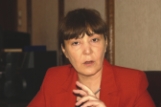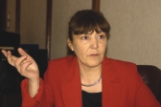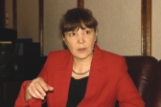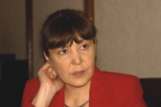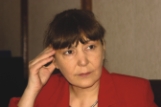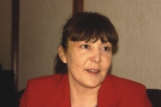| “We have a country report saying the National Anti-corruption Prosecutor's Office (NAPO) is not efficient and is not dealing with high-level corruption. Then there was the safeguard clause in the EU negotiations, then the Freedom House Audit which said the same. This is nothing new. We all know,” says Monica Macovei, the political independent appointed to the top justice post. “Then nothing happens.”
The European Parliament's mantra is that Romania's largest problem is corruption. But the office set up to combat this in 2002, NAPO, has drawn criticism for its lack of effectiveness and independence from Government interference. The incoming leadership intends to increase its efficiency, autonomy and financing to help it fulfil its mandate in time for 2007. But Macovei says this is harder than expected, especially because its very independence means it is now hard to monitor.
“[NAPO says] the European Commission is wrong, that Freedom House is wrong,” she claims, adding that “she can tell” NAPO's boss, the chief prosecutor, to resign, but he does not want to. “The procedure will take a year. That's not normal… It's a game that is only funny at the beginning,” she adds.
“I meet the European Commission and the European Parliament and they ask me: how is it going? What have you done? It's not in my hands. I am responsible for something I cannot control. I don't know what cases [in NAPO] are. They do not want to tell me.”
To bring the job of the chief prosecutor under further scrutiny, Macovei is suggesting a change in the law of revoking his position. At present the post is recommended by the Ministry of Justice, approved by the superior council of magistrates and then appointed by the President. Ioan Amarie has been in the post since 2002.
But the prosecutor can only be removed from his position if there is disciplinary sanction, such as a minor offence, which entails a trial. But there remains a question mark above who can actually issue a disciplinary notice to the office. “You can't expect the chief to discipline himself,” says Macovei. “The law is written in such a way as to keep him there forever.”
The new minister expects an annual evaluation of the role, much like any other senior job, to be law by the middle of this year and then, sometime at the end of 2005, for a six-month assessment to be carried out on the job.
Bribery of magistrates is another common problem, leading those with money and influence to find a more favourable result in the justice system. In the past, salaries of magistrates have been raised as a disincentive to taking bribes. But a further pay hike is not among Macovei's plans for the year. “Their salaries are fine compared to their level of living,” she says. “Salaries of a judge of a supreme court are three times as much as mine. It's not the only problem with corruption. We don't pay for their honesty with money.”
A common EU criticism is that Romanian justice lacks implementation. The laws are in place, but their exercise is limited. One way of proving to the EU that the Romanian law is working is through the new Anti-Corruption and Judicial Reform strategies, which are part of the conditions for entry and have so far been completed on schedule.
With NAPO, Macovei says that there is a huge difference between the number of cases registered (entering the process and being investigated) and the number of cases with indictments (going to court). But measuring the efficacy of the prosecution is hard, as its success cannot be determined on the number of those it sends to jail.
“I don't think we can talk about a number of convictions, it depends on the type of prosecutions and on the number of complaints,” she says. “It's not like producing cars or tables or chairs.”
So the Ministry will instead focus on sectors where high-level corruption takes place, such as tax evasion and in customs and excise.
Also the EU needs to see an independent judiciary and a more random distribution of cases to magistrates. “One could not deny that, in good faith, there has not been political influence in NAPO and other prosecutors' offices in cases involving political interest,” admits Macovei. “Last week I read a complaint from a prosecutor to the superior council of magistrates. He complained about political influence. Because the chief prosecutor did not like the way he was investigating a case, the case was taken away from him and given to another prosecutor. This happens quite a lot. The law allows this.”
In 2002, public prosecutor Cristian Panait was pressured by his bosses into investigating a colleague who had prosecuted the son of a former prefect in Bihor county for petrol smuggling. There was a rumour that political interference at a high level was influencing seniors in the prosecution office to force Panait to make the investigation. Panait refused to submit to such demands and his superiors took the case away from him. Despite this, Panait wrote a non-indictment decision on his colleague and turned it into the office. His superiors then took away all his cases. This was a de facto sacking. Following this, they offered to take him to a hospital to recover. Arguably, a large conspiracy surrounded Panait to demonstrate to him that he was schizophrenic and on the verge of a nervous breakdown. On 10 April 2002, he then took his own life.
It is not within Macovei's power to reopen the case (although she had made a recommendation to the prosecution office to do so), but she does not think that such an affair is unique.
To help remedy political interference, in March 2005 there was a random distribution of cases in public prosecution, which the ministry is now monitoring. In general, Macovei says she wants to introduce more objective criteria for allocating cases, which could be an alphabetical list, with each following name taking the next case available.
Also she wants to stop the power of the NAPO Chief Prosecutor to allow switches of cases between prosecutors, with only some exceptions, and to allow these lawyers to complain against the decision of the Chief.
All these are attempts to allow the working prosecutor more autonomy, but, as every employee knows, it is hard to ask a boss to give up even a tiny amount of power. |
|
